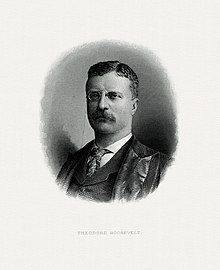American ethnicity

Theodore Roosevelt believed a distinct American race had been formed on the frontier. He equated Americanization with ethnic assimilation and spoke out against hyphenated Americans.
|
|
| Total population | |
|---|---|
| (20,875,080 6.75% of the US population in 2012) |
|
| Regions with significant populations | |
| Southern United States and Midwestern United States | |
| Languages | |
| English (American English dialects) | |
| Religion | |
|
Protestantism (Southern Baptist, Methodist, Evangelical Christian, etc.) Roman Catholicism |
|
| Related ethnic groups | |
| Anglo-Americans; English Americans; European Americans; Confederados; Canadians; British; Australians; New Zealanders; Rhodesians; British diaspora in Africa; Dutch; Germans; other Germanic people |
Americans are a North American ethnic group descended primarily from pre-revolution colonialists in the American Thirteen Colonies, most of which were English and Scotch-Irish with amounts of French, Dutch, Swedish, Welsh, and German. They generally dominated the culture and government of the United States until the later part of the twentieth century. Their primary language is American English, a distinct variety that traces to the English of the British Empire with various loanwords from native languages and other colonial languages, notably Spanish. American, as an ethnic term, has been hard to distinguish with many preferring to use hyphenated American names, using American only as a nationality. Because of this inconsistency, it is difficult to estimate the actual number of ethnic Americans. Americans make up anywhere from 7.2% to 23.3% of the United States population, possibly more. These statistics are from census data, which has its own margin of error. American ethnic identity is most commonly reported in the Southern United States, particularly in the Upper South.
...
Wikipedia
